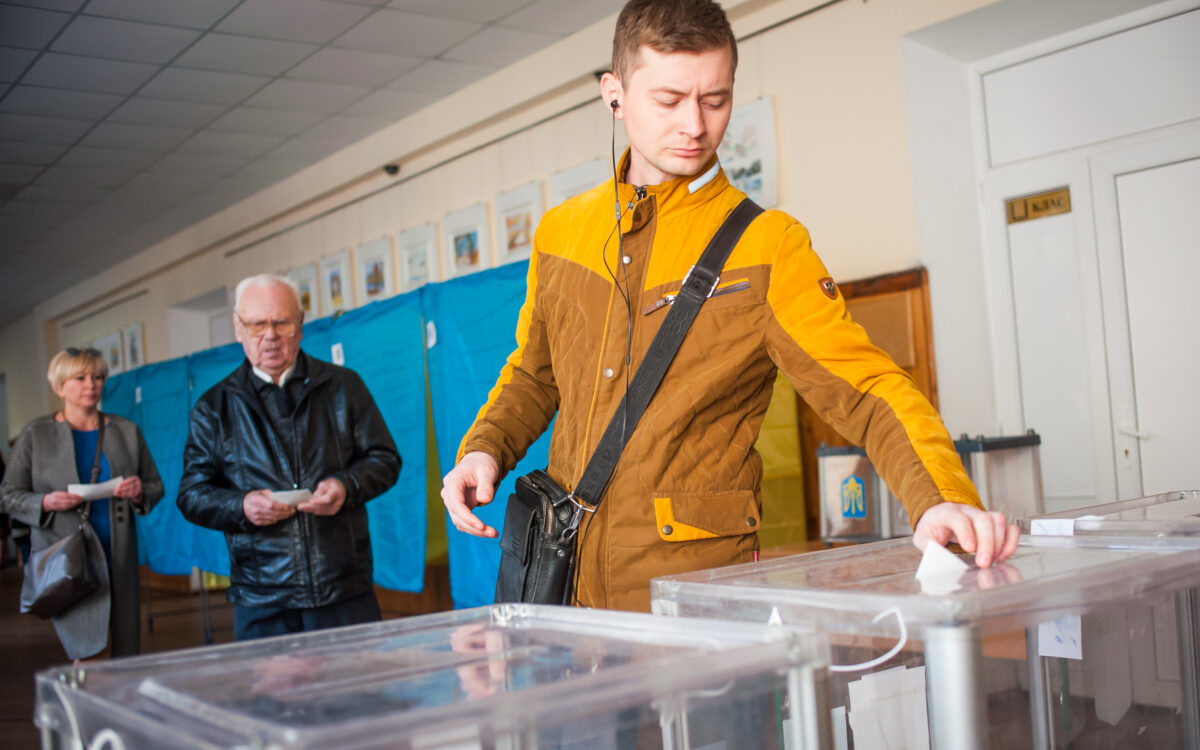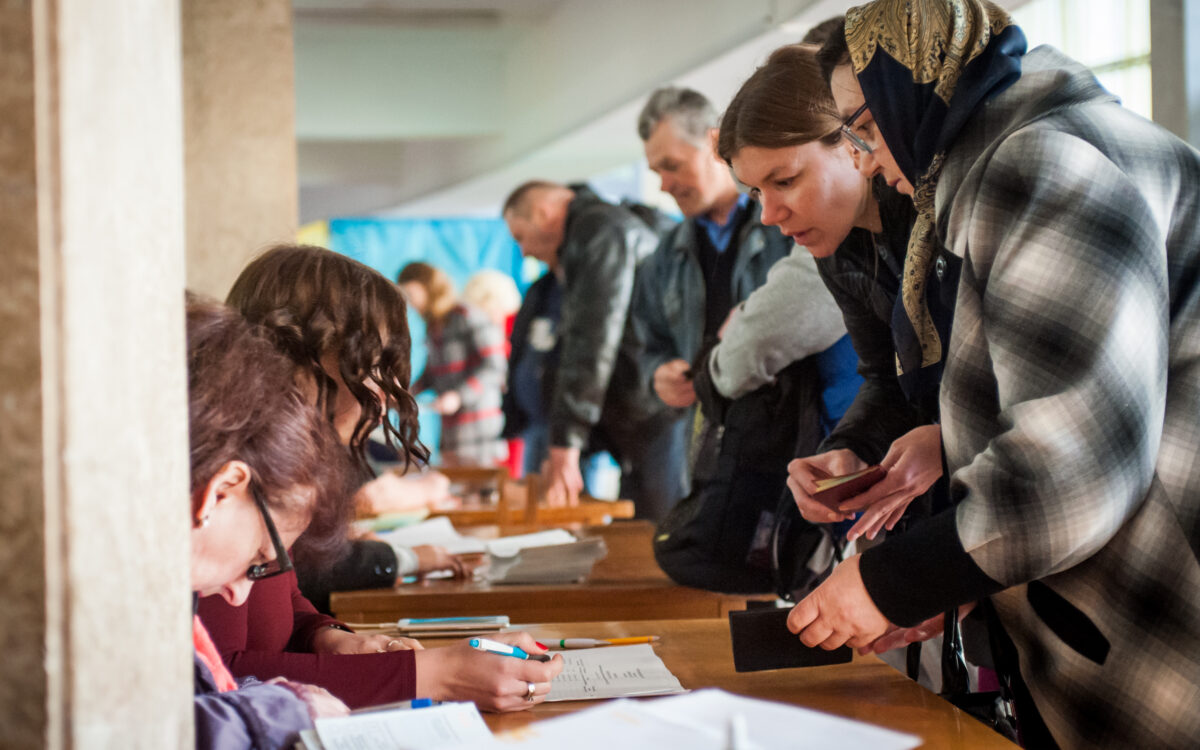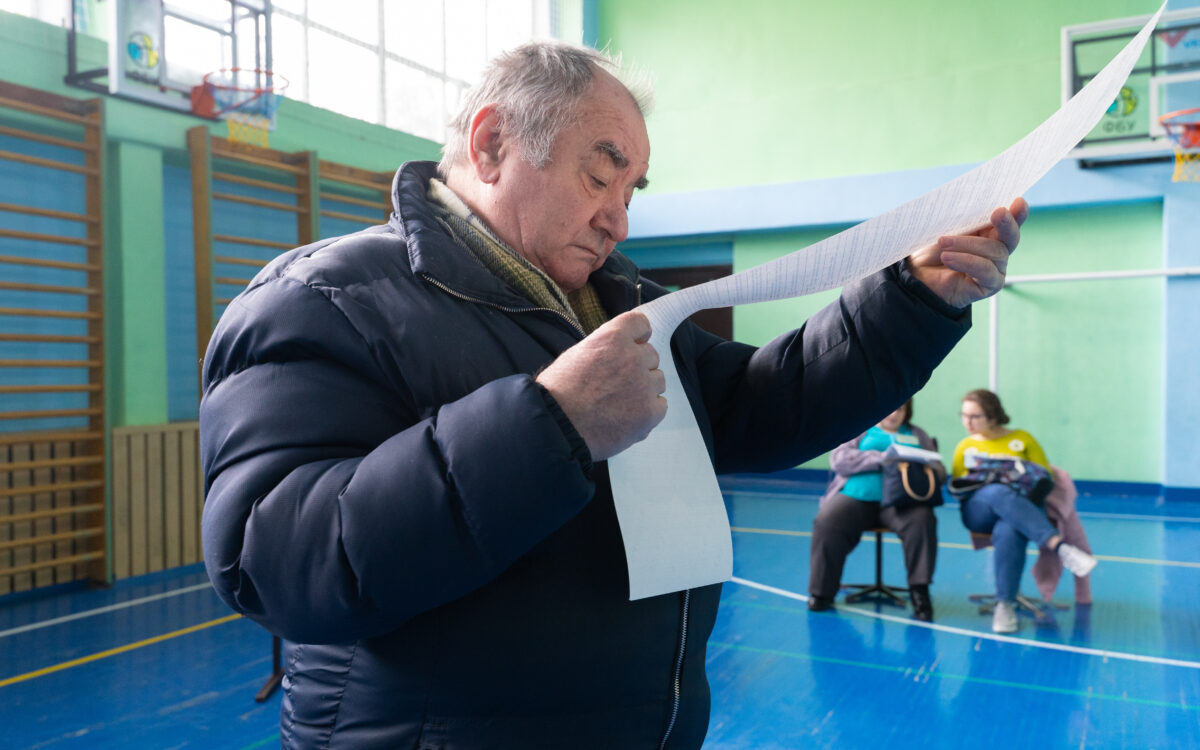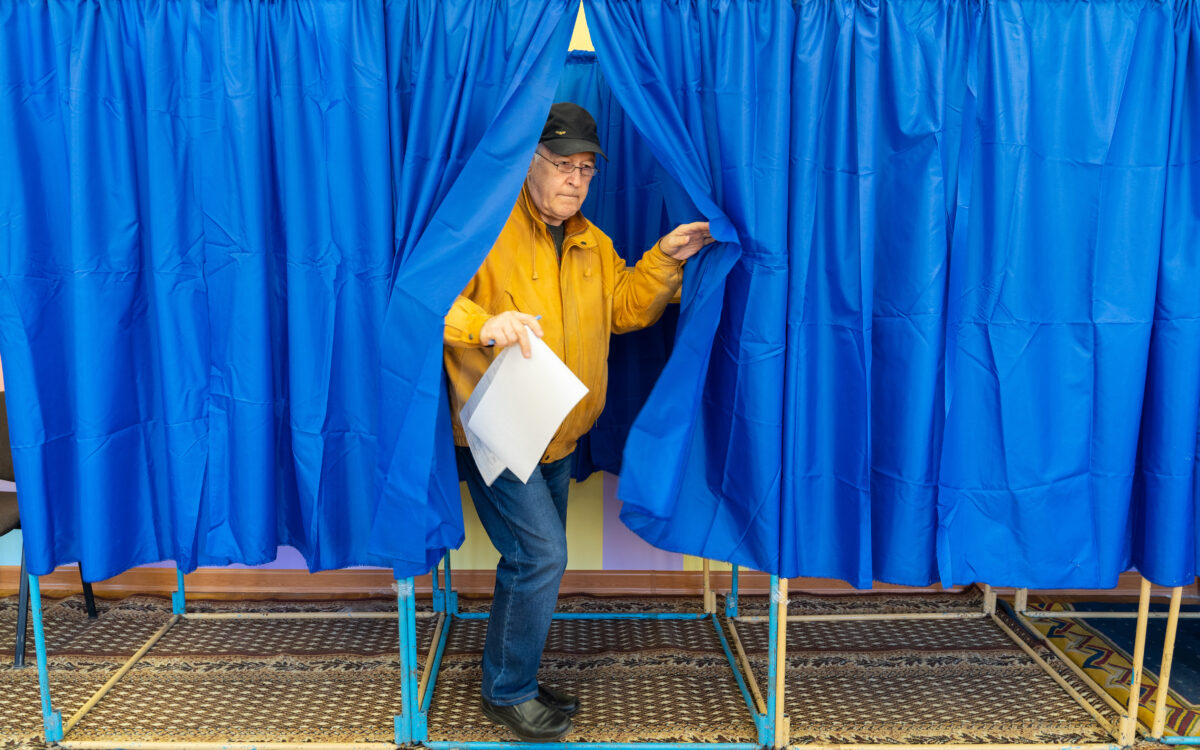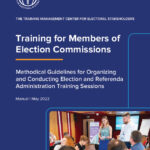
Training for Members of Election Commissions – Methodical Guidelines for Organizing and Conducting Election and Referenda Administration Training Sessions
15.04.2022
Condemning Russia’s Attempts to Orchestrate Pseudo-Referenda in Occupied Parts of Kherson and Mykolaiv Oblasts
22.04.2022CEC SUSPENDS AUTHORITY OF TERRITORIAL ELECTION COMMISSIONS IN AREAS TEMPORARILY OCCUPIED BY RUSSIAN ARMED FORCES
On April 4, the Central Election Commission (CEC) suspended the authority of Territorial Election Commissions (TECs) for the duration of the period of martial law in territories currently controlled by Russian armed forces. The decision was taken as a preemptive measure in response to threats to public safety and order and the life and health of commission members.
The decision is also intended to counteract attempts by Russia to force commission members to organize and conduct illegal referenda or elections.
The CEC resolution addresses concerns expressed by numerous TEC members in temporarily occupied territory for the life and safety of themselves and members of their families. According to reports, some TECs members have been pressured by Russian armed forces and “occupation administrations”.
The decision is justified by the fact that administering elections and referenda is not allowed during martial law, currently in force until April 25, and the primary functions of TECs cannot be performed. TECs retain other functions, including appointment of local councilors elected on political party lists to replace those who resign or pass away.
The CEC cautions against attempts by “occupation administrations” to organize unlawful referenda or elections to “legitimize” their illegal seizure of power and government functions. The risk exists that these “administrations” attempt to exert pressure on representatives of local self-government and electoral commission members.
According to The Ukrainian Parliament Commissioner for Human Rights, Liudmyla Denysova, Russian invaders plan to hold a so-called referendum in the Kherson region. According to witness reports, the “Nova Kakhovka” printing house is printing “ballots” for the “referendum”. All protocols on the results of the “vote” will be prepared in advance and delivered to the regional center. A pseudo-referendum is planned for the period from May 1 to May 10, 2022. During this period, they intend to close Kherson for entry and exit and disconnect all communications.
The CEC reiterates that referenda and elections during a state of martial law are explicitly banned by Ukrainian law. Recent amendments to the Criminal Code of Ukraine have introduced liability for Ukrainian citizens who call for or participate in the organization of unlawful referenda or election events on Ukrainian territory during martial law.
CEC LEAVES OPEN A VACANT MP SEAT
On April 4, the CEC considered filling a seat in the Verkhovna Rada which became vacant following the resignation of Member of Parliament Ilya Kyva of the Opposition Platform – For Life (OPFL) political party. He was elected as an MP on that party’s list in the 2019 Rada elections.
According to Article 105 of the Law of Ukraine On Parliamentary Elections, should the mandate of an MP proportionally elected in the nationwide multi-member constituency be terminated, the CEC shall deem the next candidate on the party’s electoral list elected as a new MP. In this particular case, the CEC has refused to follow this procedure.
On March 19, the National Security and Defense Council (NSDC) suspended activities of 11 political parties, including the OPFL, while martial law is being enforced in Ukraine. The rationale is the political connection these parties have to Russia, their collaborationist activities, their support for the unprovoked and illegal war in Ukraine and their continued activities represent a threat to the sovereignty and territorial integrity of Ukraine.
The NSDC decision was enforced in the form of a presidential decree.
The NSDC’s decision is currently with the Ministry of Justice for implementation. The Ministry clarified that the legally viable way forward is to obtain a court decision banning each of the political parties. The Ministry is preparing and filing such claims to the courts concerning each sanctioned political party.
Based on an analysis of the Ukrainian Constitution and the Law On Political Parties, the CEC found that nomination of candidates is a vital activity of a political party and that replacing an MP of a political party, currently sanctioned by the NSDC, would enable the party to carry on its activities contrary to the intention of the NSDC decision.
The CEC therefore deemed it impossible, under the circumstances of Russia’s current war on Ukraine, to approve filling the vacant seat assigned to the OPFL.
OPPOSITION PLATFORM – FOR LIFE SUSPENDS ACTIVITY IN UKRAINIAN PARLIAMENT
The Opposition Platform – For Life Rada (OPFL) political party faction has suspended its activity in the Verkhovna Rada. An Ukrinform correspondent reports that members of the party’s faction in parliament made such an announcement in the parliamentary plenary on Thursday, April 14.
While exact reasons for the decision are not known, it is likely that the faction decided to “self-dissolve” following the recent decision of the National Security and Defense Council to suspend the party’s activity.
The Opposition Platform – For Life faction included 44 members. After Russia’s invasion of Ukraine, the party’s MPs left the faction en masse.
OPORA SAYS CONDITIONS SHOULD BE MET TO HOLD NATIONAL REFERENDUM
Amidst speculations about a potential national security referendum on Ukraine’s post-war future, Civil Network OPORA states that certain conditions should be met. In its analysis, shared on April 12, Civil Network OPORA concludes a national referendum in Ukraine covering a security treaty can only be called by popular initiative.
For the referendum to meet both national law and general democratic standards, Russian Federation troops should withdraw from Ukraine, necessary infrastructure should be restored and Ukrainian internal migrants and refugees should be given the possibility to vote. Civil Network OPORA’s full analysis is available following the link.
CIVIL NETWORK OPORA COLUMN ON INTERNET VOTING RISKS
Civil Network OPORA analyst Yurii Lisovskyi argues in a published article for Censor.NET that voting in national elections and referendum through the Internet should not be pursued, despite as tempting as it may be.
Mr Lysovskyi writes that during post-war rebuilding, interruptions to the Internet can happen, and it will significantly hinder the voting process.
Moreover, Ukraine has sustained several cyberattacks in recent months. Electoral and information technology experts also point to the recent theft of certain local population registers and potential service disruptions. He argues that citizens trust analog voting – i.e. voting with ballot papers – because they understand how it works. He warns that conflicts and disputes can arise if “virtual elections” – i.e. through the Internet – are interrupted or destroyed.
The column is available via the link (in the Ukrainian language).
THE PARLIAMENT RECOGNIZES RUSSIAN ARMY’S ACTIONS IN UKRAINE AS GENOCIDE OF THE UKRAINIAN PEOPLE
During its April 14 session, the Parliament adopted a resolution recognizing the actions of the Russian army in Ukraine as genocide of the Ukrainian people.
“The actions committed by the armed forces of the Russian Federation are not just a crime of aggression; but, pursue the goal of systematic and consistent destruction of the Ukrainian people, their identity and deprivation of their right to self-determination and independent development,” the MPs said in the explanatory note to the resolution. “This requires immediate recognition of the actions committed by the Russian army during the last phase of the Russian armed aggression against Ukraine, which started on February 24, 2022, with the genocide of the Ukrainian people.”
The resolution also calls on the United Nations, the Parliamentary Assembly for the Council of Europe (PACE), the European Parliament, the Organization for Security and Cooperation in Europe’s Parliamentary Assembly (OSCE-PA), the North Atlantic Treaty Organization’s Parliamentary Assembly (NATO-PA) and foreign governments and parliaments to recognize the actions of the military of Russia in Ukraine as genocide of the Ukrainian people.
According to the Dom television channel, 363 MPs voted for the resolution on April 14.
SUPPORTING INTERNALLY DISPLACED PERSONS AFFECTED BY RUSSIA’S WAR AGAINST UKRAINE
To support internally displaced persons (IDPs) affected by Russia’s war against Ukraine and help them adapt to life in new communities, IFES and its civil society partner, the Group of Influence (GoI), launched social media information campaign. It explains Ukrainian legislation guaranteeing civic rights and access to essential services for Ukrainians affected by the war. Informational posts are placed on the GoI’s Facebook page.
The social media posts among others, explain to Ukrainian citizens how to reimburse communal expenses from the budget of the local community for IDP support, receive IDP certificates online and through Centers of Administrative Services apply for e-support services; and, extend the validity period of Oschadbank cards to continue receiving social benefits.
The website also features articles on peculiarities of internal displacement in Ukraine and information to Ukrainians on where to stay in the European Union, either as tourists or applicants for asylum or temporary protection. On April 4, the GoI began publishing an informational bulletin containing important legislative updates relevant to IDPs.
DIGITAL SECURITY EVENTS FOR IFES CIVIC EDUCATION COURSE STUDENTS
In the backdrop of air sirens, displacement, and unimaginable human suffering, six partner universities with support from IFES have adapted and continued offering civic education to its students, reaching nearly 300 this semester, with more to join in the coming weeks. Educators have added greater emphasis on wartime disinformation, digital literacy, and psychological wellbeing this semester.
Also, several side events for students and educators were organized. On March 23, IFES organized an online lecture on digital literacy and fact-checking during the war. Twenty-six people joined the event. Alyona Romaniuk, Editor-in-Chief of the project “On the Other Side of Putin’s Lies”, and a founder of the project NotaEnota, discussed the informational war and cases of disinformation and fakes and actively engaged students to share experience as consumers of information during wartime.
On April 6, another online event for IFES civic education course students focused on personal digital security during wartime. This event assembled 15 students, who received practical advice on personal digital safety and good cyber hygiene practices, protection of personal gadgets, and personal data in social networks.
The session was facilitated by IFES technology and cybersecurity experts, Anna Denis and Mykhailo Gorkusha.



